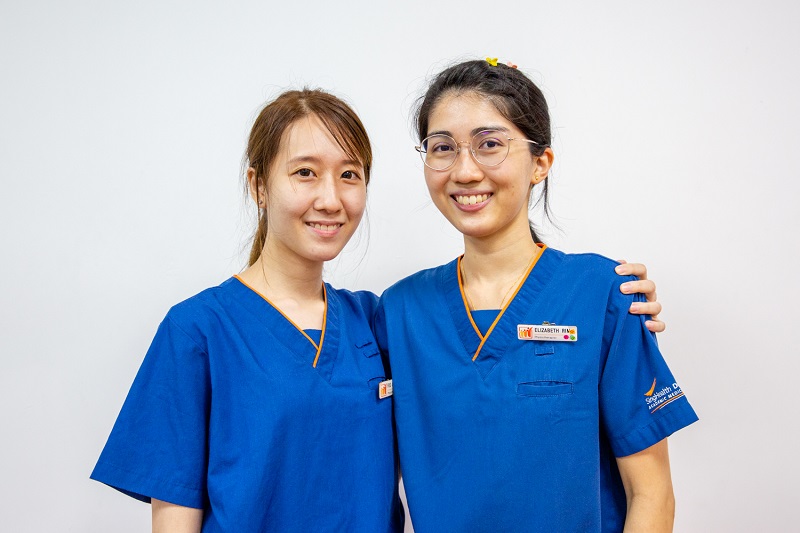%202.jpg)
SKH Physiotherapist Elizabeth guiding a patient on a 'Sit to stand exercise' performed with shoulder flexion and abduction using a theraband
Improving quality of life for the elderly with exercise
It's important to stay healthy as we age and face issues such as a gradual loss of mobility and the maintenance of cognitive function (multiple brain-based functions that enable us to carry out any given task). One way to overcome these challenges is exercise – whether it be at home, the park or in the gym. After all, exercise helps the elderly remain active which, in turn, helps their mental and emotional health. That's because the body releases endorphins, the feel-good hormone, when we exercise.
Exercise also helps to maintain a good physical baseline as it fights off the deterioration of muscle mass and reduces the risk of heart disease, diabetes and dementia. This helps to reduce the elderly's risk of falls and injuries, helping to maintain their independent functions such as day-to-day activities.
This is where physiotherapy come in – no, it's not like receiving a massage, as some people may think – with exercises and treatment plans to enable patients to take ownership of their health and participate actively in day-to-day activities.
Physiotherapists Elizabeth Rim and Foo Li Xin from Sengkang General Hospital provide some tips on safe exercise for the elderly. They also shared how the community can support the elderly and what they find most meaningful about their profession.

From left to right: Foo Li Xin and Elizabeth Rim
What inspired you to be a physiotherapist?
Elizabeth: I want to help elderly patients in their rehab journey. As a physiotherapist, I like that we get to spend a significant amount of time with our elderly patients daily in the inpatient setting and work with them to achieve their goals.
Li Xin: Similarly, I have a soft spot for the elderly and have always wanted to be in a profession that allows me to interact with people on the ground. Being a physiotherapist has always been one of my top few career choices.
What are some exercises that the elderly can do?
Elizabeth: They can engage in walking, bodyweight workouts, theraband exercises, tai chi, cycling, swimming etc. Exercising with a group can be more motivating and fun too.
Li Xin: Additionally, they can do simple exercises like sit-to-stands, marching on the spot and using water bottles to strengthen their upper limbs.
What are some of the things the elderly should be mindful of when embarking on an exercise routine/programme?
Elizabeth: Take caution to avoid an inactive lifestyle, but at the same time avoid going from 0 to 100 all of a sudden if you are normally very sedentary. Graduated loading is important to allow your body time to adjust to movement.
Li Xin: Those with difficulty in balancing should be mindful of doing exercises that are challenging for them. The environment should be checked; for example, ensure that the ground is not slippery and avoid using chairs that are too light which might slide off during exercises. It is best to exercise with someone else at home, in case of an accident.
How can the elderly avoid getting injured when exercising at home?
Elizabeth: Try to exercise in a safe environment. For example, use a sturdy chair to perform sit-to-stand exercises, avoid backless/plastic chairs that slide around.
Li Xin: They can try to maintain a form of basic physical activity level from home. Doing simple household chores or walking along corridors can also help to maintain a basic level of activeness.
How can the community support the elderly exercising at home?
Elizabeth: Exercising with your family and friends! This will also kill two birds with one stone – keeping fit and bonding by spending time together.
Li Xin: Apart from exercising together, family and friends can also remind them in a non-stressful manner to exercise and remain active. They can also help identify good alternatives to exercise which their elderly family members may like. For example, a walk in the park or exercising in a group.
What do you find most meaningful in this line of work?
Elizabeth: Seeing patients achieve their goal, and when you can tell that it means a lot to them – that they finally did it. While these things may be as simple as walking five meters to the toilet or standing up without assistance – things we take for granted every day – these acts are of importance to the elderly and their independence. The ability to do these tasks themselves gives the elderly a sense of purpose and self-worth, which in turn improves their quality of life.
Li Xin: To me, it's the ability to empower someone positively and helping them accomplish what they wish to do. This gives them more enjoyment and happiness to living after a sickness.
How has being a physiotherapist helped your family members and/or friends?
Elizabeth: I was able to help an overseas friend who was complaining of neck and shoulder pain from overusing the computer for work via a video call. This was an interesting experience of performing assessments remotely as there was no hands-on treatment such as manual therapy. Thankfully, my friend reported that the exercises helped!
Li Xin: As a physiotherapist, I was able to advise my close friend who has Parkinson's and to empower them in their journey. While they were wary of exercising and deteriorated quickly initially, some handholding helped them to exercise independently. I am happy to share that their functions have been well maintained and they are now an advocate of exercise themselves.
%202.jpg)
Physiotherapist Foo Li Xin guiding a senior on the 'Sit to stand exercise', with arms crossed over chest
For more information about a career in Physiotherapy, visit
https://www.caretogobeyond.sg/ahp